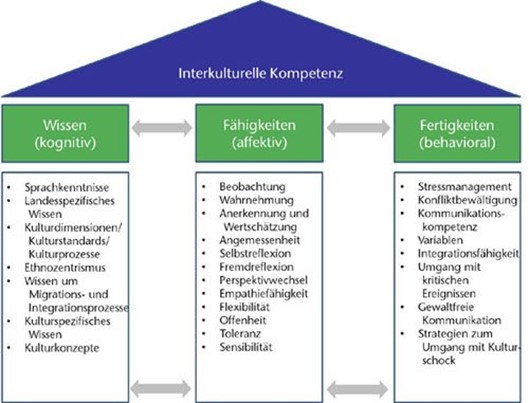
Intercultural competence in companies
Every individual has personal, unique experiences. Are you aware of how much their social and cultural background shapes everyone? It is incredible what unimagined potential a diverse group of people working together can unleash! Develop this potential by making your employees aware of these differences. Everyone benefits from knowing how to leverage each ’other’s strengths professionally.
This opportunity is available for internal projects and when working with external partners. Your customers, suppliers, and even the government agencies you rely on to succeed may have little knowledge of cross-cultural differences. At Arches Consulting, we bridge these differences. We enable you and your employees to unleash the full power of your internal and external collaboration.
We develop special packages based on your and our experience and proven benchmarks. The following challenges may require this training:
How we empower you
- Professional support to establish your business in Central Europe
- Organizational improvements
Process optimizations - Promote cooperation across intercultural teams
- Accompany the transformation journey towards an agile organization
- Solving intercultural conflicts for better collaboration

The initial situation
Two employees of an international company discuss the current status of a project they are jointly driving forward. The project manager and the developer revise the plan for the next steps required to keep the project on time and within budget.
The very next day, an update is sent to the project team, and the developer is distraught. He sees only a few of the points discussed the day before implemented in the update.
Do you recognize thinking to yourself: “That’s just like us!”
But how can such situations be part of everyday life in the business world? How can misunderstood communication affect international business? What can you do to minimize such events and the associated friction losses caused by misinterpretations in the long term?
Intercultural competence of employees is an indispensable combination of skills, behavior, and knowledge for this purpose.
What do we mean by intercultural competence?
As a first reflex, the answer is the ability to communicate and act together across cultural boundaries.
This is undoubtedly a correct, albeit only a rough summary. In particular, the necessary skills should be explained here. Further, the term cultural boundary is very fuzzy. Which culture are we talking about? You will find an exciting reflection on this as well.
As “One cannot not communicate” (Paul Watzlawick), the topic of communication, or how we communicate with each other, is only marginally considered here.
What skills do your employees need in intercultural business?
People who display intercultural competence “are on the one hand able to achieve their own goals (effectiveness), but on the other hand also willing or able to respect the purposes of the other person and to follow rules of conduct that are important to the partner (appropriateness).“ (Müller/ Gelbrich)
With this very pointed summary, it quickly becomes clear how crucial it is for your employees to have at least two different perspectives and to be able to use them consciously:
First: The basis is a stable self-orientation – who am I, what do I want, what do I expect, what am I willing to give.
Second: Curiosity and openness to new things may also differ from what we have known so far. Particularly in the first encounter, openness coupled with positive curiosity is essential -“You will never get a second chance to make a first impression.
These qualities can be trained and refined through challenging experiences. As with any training, one person will find it easy because they already have the necessary dispositions. The others may find it a bit more complicated because their essential socialization may have set a different tone. The willingness to approach new people without prejudice is mandatory for profitable intercultural cooperation.
In this diagram, the three essential pillars that support intercultural competence are excellently summarized. They are knowledge, skills, and abilities.

Looking for an intercultural business consultant?
What do we mean by cultural boundaries?
First and foremost, culture and national origin are often equated. In our view, this falls far short of the mark. Indeed, there are already communication difficulties between people of different nationalities for linguistic reasons alone. But even in areas with a common language, very different cultures have established themselves due to social origin, education, experience, and other factors.
Even in the immediate environment, one can speak of different cultures, for example, between other families or employees of various company departments. Even in these familiar settings, we can often observe how difficult it is for the IT team, for example, to explain the introduction of new software to the logistics team.
Since we are accustomed to these situations within our everyday environment or system, they are seldom handled with the necessary attention.
“Interculturality can take place on an individual level as well as on an organizational level.” (Jürgen Bolten)
When members of different cultural backgrounds meet, an intercultural action process is created – ideally, communication with language, gestures, and facial expressions. This can generate exciting new insights.
However, we often observe that the path can lead to misunderstandings and, thus, frustration.
At this point, it is necessary to provide support through training, consulting, systemic coaching, or other appropriate measures.

Why is intercultural competence so important, and wherein the company is intercultural competence needed?
In today’s increasingly complex business world with networks spread out globally, intercultural competence is a backbone for all companies that want sustainably assert themselves. Learning from each other and working across cultural boundaries is imperative to create something new. A symbiosis of different cultural backgrounds is created. These constant innovations are essential for survival, especially for internationally operating corporations. But even companies that are focused on their local market benefit considerably from the ability of their employees to be interculturally competent.
Especially employees in hands-on positions such as sales, management, or similar should have the appropriate abilities. So, it is understandable that in more and more job applications, the topic is at the top of the list of required skills.
How can intercultural competence be promoted?
When employees work abroad, we strongly recommend supporting measures to operate successfully on site: At the very least, English as a global business language must be mastered with confidence. Knowledge of the local language is always beneficial and enables active participation in the daily life of the foreign culture.
This is immediately followed by the ability and willingness to holistically apply the points explained under 1.1 regarding knowledge, skills, and abilities. A pre-departure training program should be standard, especially for less experienced people. Through a mentoring program on-site or systemic coaching to strengthen the relevant skills and targeted activities, each characteristic and behavior will be reinforced in the long term. If we accompany employees abroad accordingly, they will successfully master the process of behavioral change to flourish in any foreign culture. As a result, they will be able to represent your company in a self-assured and confident manner and act profitably.
The same applies to employees from abroad who work for your company in Germany. They should be supported with similar, individually adapted measures to be able to use the full potential of intercultural cooperation.

Conclusion
Intercultural competence is a supporting pillar for all corporations that want to succeed in the long term. As shown, this is especially true for globally operating companies. But also, it is more and more crucial for local providers to prioritize this topic.
Intercultural competence demonstrated by empathic, open, interested, and tolerant behavior helps avoid misunderstandings, generate new inspiring ideas, and create great successes together.
And lastly: it is much fun!
